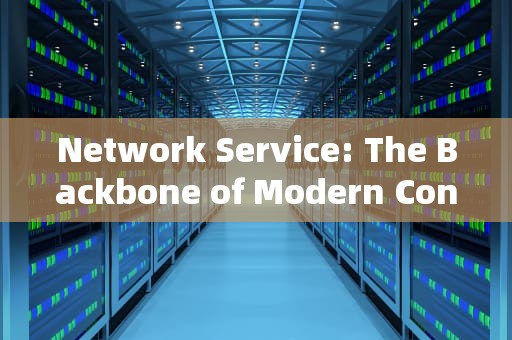In today's interconnected world, the term "network service" has become ubiquitous, yet its true significance often goes unnoticed. At its core, a network service refers to any functionality or capability offered by a computer network that enables communication, data sharing, and resource utilization among devices. These services form the backbone of modern connectivity, facilitating everything from simple email exchanges to complex cloud computing infrastructures. This article delves into the intricacies of network services, exploring their types, functionalities, and the pivotal role they play in both personal and professional realms.

Understanding Network Services
A network service can be broadly defined as any service provided over a network that allows users to access resources, applications, or information remotely. These services are typically categorized into two main groups: client-server services and peer-to-peer (P2P) services. Client-server models involve a central server providing services to multiple clients, while P2P networks allow each participant to act as both a client and a server, enabling direct communication between nodes.
Types of Network Services
1、Web Hosting Services: Perhaps the most recognizable form, web hosting services enable individuals and organizations to make their websites accessible via the internet. These services range from shared hosting, where multiple websites reside on a single server, to dedicated hosting and virtual private servers (VPS), offering varying degrees of control, performance, and security.
2、Email Services: Email remains one of the fundamental communication tools in our digital age. Network services like Simple Mail Transfer Protocol (SMTP), Post Office Protocol (POP3), and Internet Message Access Protocol (IMAP) facilitate the sending, receiving, and storage of emails across the globe.
3、File Sharing and Storage Services: With the rise of big data, efficient file sharing and storage solutions have become paramount. Services like Dropbox, Google Drive, and OneDrive leverage network infrastructure to provide seamless synchronization and access to files from anywhere, at any time.
4、Cloud Computing Services: Cloud services, including Infrastructure as a Service (IaaS), Platform as a Service (PaaS), and Software as a Service (SaaS), have revolutionized how businesses operate. They offer scalable resources, development platforms, and fully managed applications over the internet, enabling cost-effective and flexible IT operations.
5、Virtual Private Network (VPN) Services: VPNs create secure connections over public networks, allowing remote workers to access corporate resources safely. They encrypt data transmission, ensuring privacy and protecting sensitive information from interception.
6、Content Delivery Networks (CDNs): CDNs distribute content closer to end-users by using a global network of servers, reducing latency and improving website loading speeds. This is crucial for streaming services, online gaming, and large-scale e-commerce platforms.
7、Remote Desktop Services: These services enable users to access and control desktop environments hosted on remote servers. This is particularly useful for IT support, software development, and work-from-home scenarios.
8、VoIP (Voice over Internet Protocol) Services: VoIP transforms voice communications into digital signals transmitted over the internet, offering cost-effective alternatives to traditional telephone systems. Popular examples include Skype, Zoom, and WhatsApp calls.
9、Database Services: Cloud-based database services like Amazon RDS, Google Cloud SQL, and Microsoft Azure SQL Database provide managed relational databases, simplifying data management, scaling, and high availability.
10、Network Security Services: Firewalls, intrusion detection systems (IDS), and antivirus software protect networks from cyber threats. Managed security services offer continuous monitoring and response to ensure robust protection against evolving attack vectors.
The Importance of Network Services
The proliferation of network services has transformed the way we live, work, and communicate. They underpin the functioning of modern economies, enabling global trade, collaboration, and innovation. Here are some key reasons why network services are indispensable:
Enhanced Collaboration: Network services facilitate real-time collaboration across geographical boundaries, fostering teamwork and knowledge sharing.
Scalability and Flexibility: Businesses can easily scale their operations up or down based on demand, optimizing resource utilization and reducing costs.
Accessibility: Services like VPNs and cloud computing ensure that employees can work remotely without compromising productivity or security.
Disaster Recovery: Network services often include backup and recovery options, making it easier to restore operations after disruptions like natural disasters or cyberattacks.
Innovation Catalyst: By abstracting away complex infrastructure management, network services empower developers and entrepreneurs to focus on creating innovative solutions and applications.
Challenges and Future Trends
Despite their numerous benefits, network services also face challenges such as data privacy concerns, cybersecurity threats, and the need for constant upgrades to keep pace with technological advancements. Additionally, there is an ongoing debate about net neutrality, which could impact how these services are delivered and accessed.
Looking ahead, the future of network services promises even greater integration with emerging technologies like artificial intelligence (AI), the Internet of Things (IoT), and 5G connectivity. AI-driven automation will enhance service efficiency and personalization, while 5G's high-speed, low-latency capabilities will open new frontiers for real-time applications and smart cities.
Moreover, as quantum computing advances, we may witness a paradigm shift in network security and data processing capabilities, further redefining the landscape of network services.
Conclusion
Network services are the unsung heroes of our digital ecosystem, quietly enabling the seamless flow of information and resources that powers our daily lives. From enabling global communication to driving business innovation, their impact is profound and far-reaching. As technology continues to evolve, so too will the capabilities and importance of network services, solidifying their position as the backbone of modern connectivity for generations to come.
随着互联网的普及和信息技术的飞速发展台湾vps云服务器邮件,电子邮件已经成为企业和个人日常沟通的重要工具。然而,传统的邮件服务在安全性、稳定性和可扩展性方面存在一定的局限性。为台湾vps云服务器邮件了满足用户对高效、安全、稳定的邮件服务的需求,台湾VPS云服务器邮件服务应运而生。本文将对台湾VPS云服务器邮件服务进行详细介绍,分析其优势和应用案例,并为用户提供如何选择合适的台湾VPS云服务器邮件服务的参考建议。

工作时间:8:00-18:00
电子邮件
1968656499@qq.com
扫码二维码
获取最新动态
